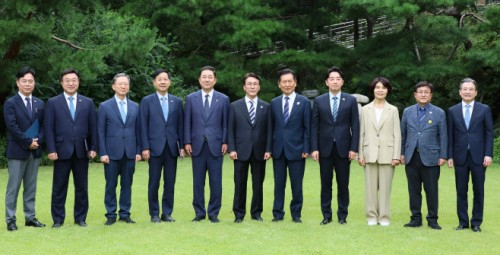 |
| Prime Minister Kim Min-seok (center) poses for a commemorative photo with Democratic Party leader Jung Chung-rae, Presidential Chief of Staff Kang Hoon-sik, and other senior officials during a high-level policy meeting at the prime minister’s residence in Seoul on September 7. / Source: Yonhap News |
The Lee Jae-myung administration has finalized a landmark government reorganization plan that includes abolishing the Prosecutors’ Office, splitting the Ministry of Economy and Finance (MOEF), and creating a new broadcasting regulator.
At a high-level ruling bloc meeting held Sunday at the prime minister’s residence in Seoul, senior officials from the government, the Democratic Party, and the presidential office endorsed the overhaul.
Prosecutors’ Office to be dismantled
Under the plan, the Prosecutors’ Office will be dissolved and split into two bodies: the Serious Crimes Investigation Office (SCIO) and the Prosecution Office. These new agencies will be launched one year after the revised law is promulgated, to allow time for preparation.
MOEF to be split in two
The Ministry of Economy and Finance will be divided into a Ministry of Finance and Economy (MOFE) and a Planning and Budget Office under the Prime Minister’s Office.
The Planning and Budget Office will handle budget formulation, fiscal policy, and management.
The MOFE will oversee economic policy coordination, treasury operations, and public financial institutions. The finance and economy minister will also serve as deputy prime minister for the economy.
Domestic financial policy will move from the Financial Services Commission (FSC) to MOFE. The FSC itself will be reorganized into a Financial Supervisory Commission, focused on oversight.
The separation is set to take effect on January 2, 2026, to align with the budget review calendar.
New climate and media agencies
The Environment Ministry will be upgraded into a Ministry of Climate, Energy, and Environment, tasked with carbon neutrality and energy transition. Resource industries and nuclear export functions will remain with the Ministry of Trade and Industry.
The Korea Communications Commission will be abolished, replaced by a Broadcasting, Media and Communications Commission. Broadcasting promotion policies currently under the Ministry of Science and ICT will also be transferred to the new body.
Other changes
The post of deputy prime minister for social affairs will be eliminated due to its wide scope and limited effectiveness.
Once the reforms are complete, the central government structure will shift from the current 19 ministries, 3 offices, 20 agencies, and 6 commissions to 19 ministries, 6 offices, 19 agencies, and 6 commissions.
The Democratic Party plans to submit the reorganization bill immediately and seek passage at the National Assembly’s plenary session on September 25. “We will work to ensure the bill is passed by the end of the month,” said Han Jeong-ae, DP policy chief.
Most Read
-
1
-
2
-
3
-
4
-
5
-
6
-
7





















